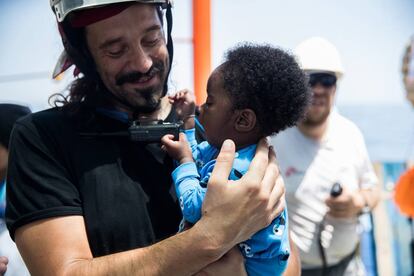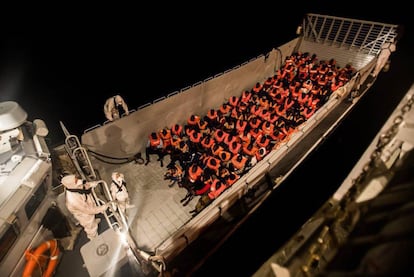Italian military ships to escort ‘Aquarius’ to Spanish port of Valencia
Decision to make 1,300-km journey with 629 people on board the migrant rescue vessel, some of whom need medical attention, follows a night of negotiations


The 629 migrants who were rescued on Saturday night off the coast of Libya and denied entry into Italy and Malta will be taken to Spain’s eastern port of Valencia, said an official with Doctors Without Borders (MSF) at around 6am on Tuesday.
Spain’s new prime minister, Pedro Sánchez of the Socialist Party (PSOE), had offered to take in the immigrants on Monday following Italy and Malta’s refusal to let the rescue ship Aquarius dock in either country.
But concerns about the long voyage – around 1,300 kilometers (700 nautical miles) from its current position – and about the health conditions of several migrants had delayed the decision.

Early on Tuesday morning, the coordinator for the non-profit aid group Doctors Without Borders, which has staff aboard the Aquarius, confirmed that the journey to Spain will go ahead.
The Aquarius will carry around 100 immigrants to their new destination, while the rest will be transferred to two additional vessels from Italy’s Coast Guard and Navy. Italian authorities were expected to deliver supplies to the rescue ship on Tuesday morning.
The early morning decision follows a night of extended negotiations through the Rescue Coordination Center in Rome, which handles all rescues and migrant arrivals.
The mood on board the ‘Aquarius’ remains calm for now, but there is a growing undercurrent of tension
Late on Monday, the Aquarius’s rescue coordinator, Nicola Stalla, had said that it would be impossible for the entire group of migrants to make the journey to Valencia on board the rescue ship, as it would mean sleeping out in the open in deteriorating weather conditions. The group includes seven pregnant women, 123 unaccompanied minors and people suffering from burns caused from a mixture of seawater and fuel.
The Valencia option was satisfactory for Italy, whose new populist government has taken a hard stand against immigration. As soon as the decision was made, Italy’s Interior Minister, Matteo Salvini of the right-wing, anti-immigration League, sent out a message on Twitter: “VICTORY! 629 immigrants aboard the ship Aquarius headed for Spain, primary goal achieved!”
VITTORIA!
— Matteo Salvini (@matteosalvinimi) June 11, 2018
629 immigrati a bordo della nave Aquarius in direzione #Spagna, primo obiettivo raggiunto! #chiudiamoiporti pic.twitter.com/dNmLyNRaVo
The mood on board the Aquarius remains calm for now, but there is a growing undercurrent of tension. Although none of the migrants are in critical condition, many of them are ill, and seven women are pregnant. All of them recently left Libya, where conditions for sub-Saharan migrants could best be described as hellish.
Everyone is exhausted, and the daily fight for a sleeping spot on deck is creating friction among this large group of people stuck together in a reduced space: the Aquarius is 77 meters long and made for holding no more than 550 migrants for two to three days.
The Aquarius is one of the few remaining non-profit rescue ships left in the central Mediterranean, where so far this year 784 migrants have drowned during the crossing, according to figures from the United Nations Refugee Agency.
On Friday of last week, it was the first vessel to reach the coast of Libya after a new populist and openly anti-immigrant government had taken office in Italy. By early Saturday morning, the Aquarius had rescued 229 migrants at risk of drowning after one of their rubber dinghies collapsed. The other 400 were transferred onboard after being saved by Italian military and merchant ships in the vicinity.
English version by Susana Urra.
Tu suscripción se está usando en otro dispositivo
¿Quieres añadir otro usuario a tu suscripción?
Si continúas leyendo en este dispositivo, no se podrá leer en el otro.
FlechaTu suscripción se está usando en otro dispositivo y solo puedes acceder a EL PAÍS desde un dispositivo a la vez.
Si quieres compartir tu cuenta, cambia tu suscripción a la modalidad Premium, así podrás añadir otro usuario. Cada uno accederá con su propia cuenta de email, lo que os permitirá personalizar vuestra experiencia en EL PAÍS.
¿Tienes una suscripción de empresa? Accede aquí para contratar más cuentas.
En el caso de no saber quién está usando tu cuenta, te recomendamos cambiar tu contraseña aquí.
Si decides continuar compartiendo tu cuenta, este mensaje se mostrará en tu dispositivo y en el de la otra persona que está usando tu cuenta de forma indefinida, afectando a tu experiencia de lectura. Puedes consultar aquí los términos y condiciones de la suscripción digital.








































